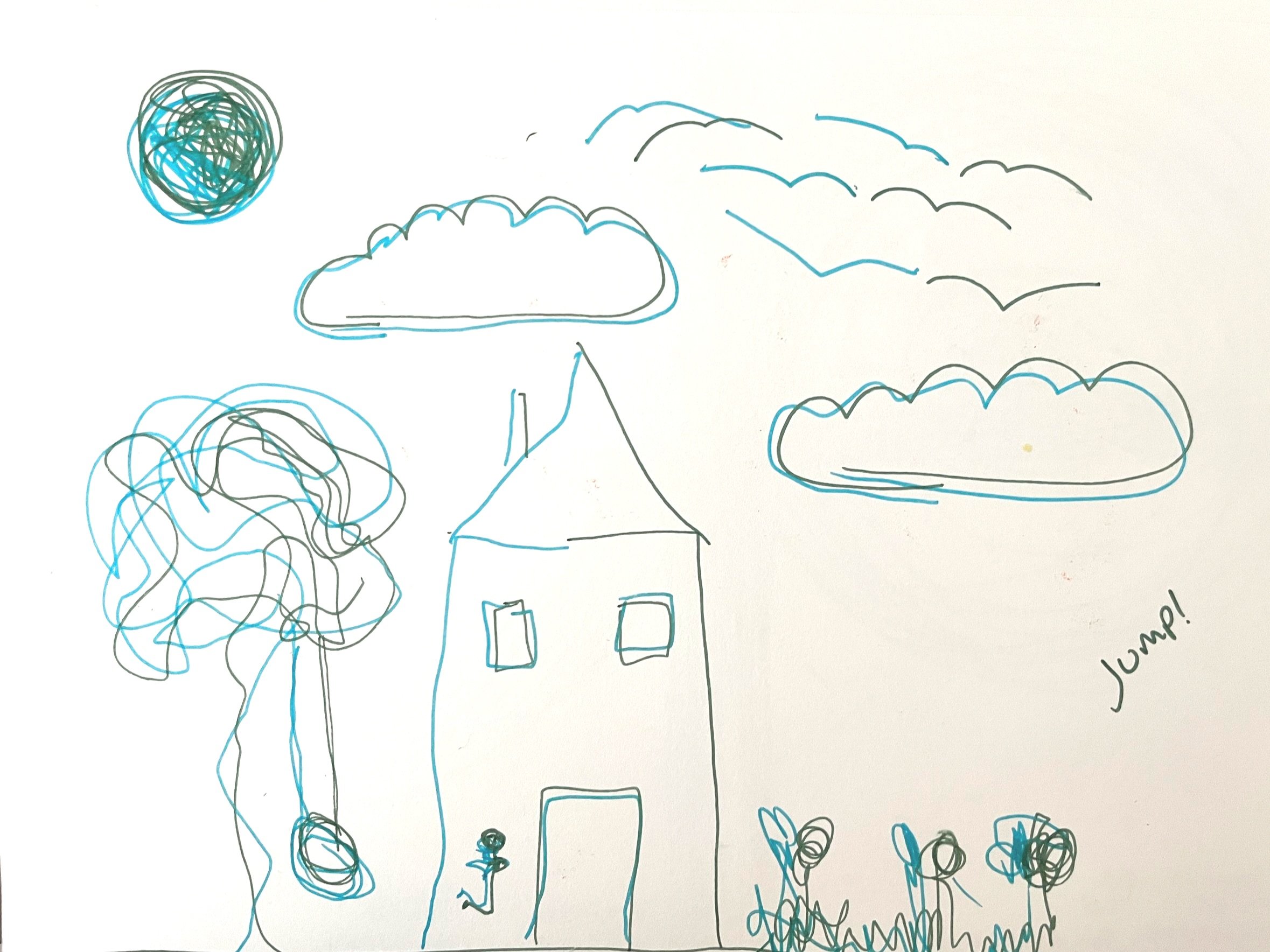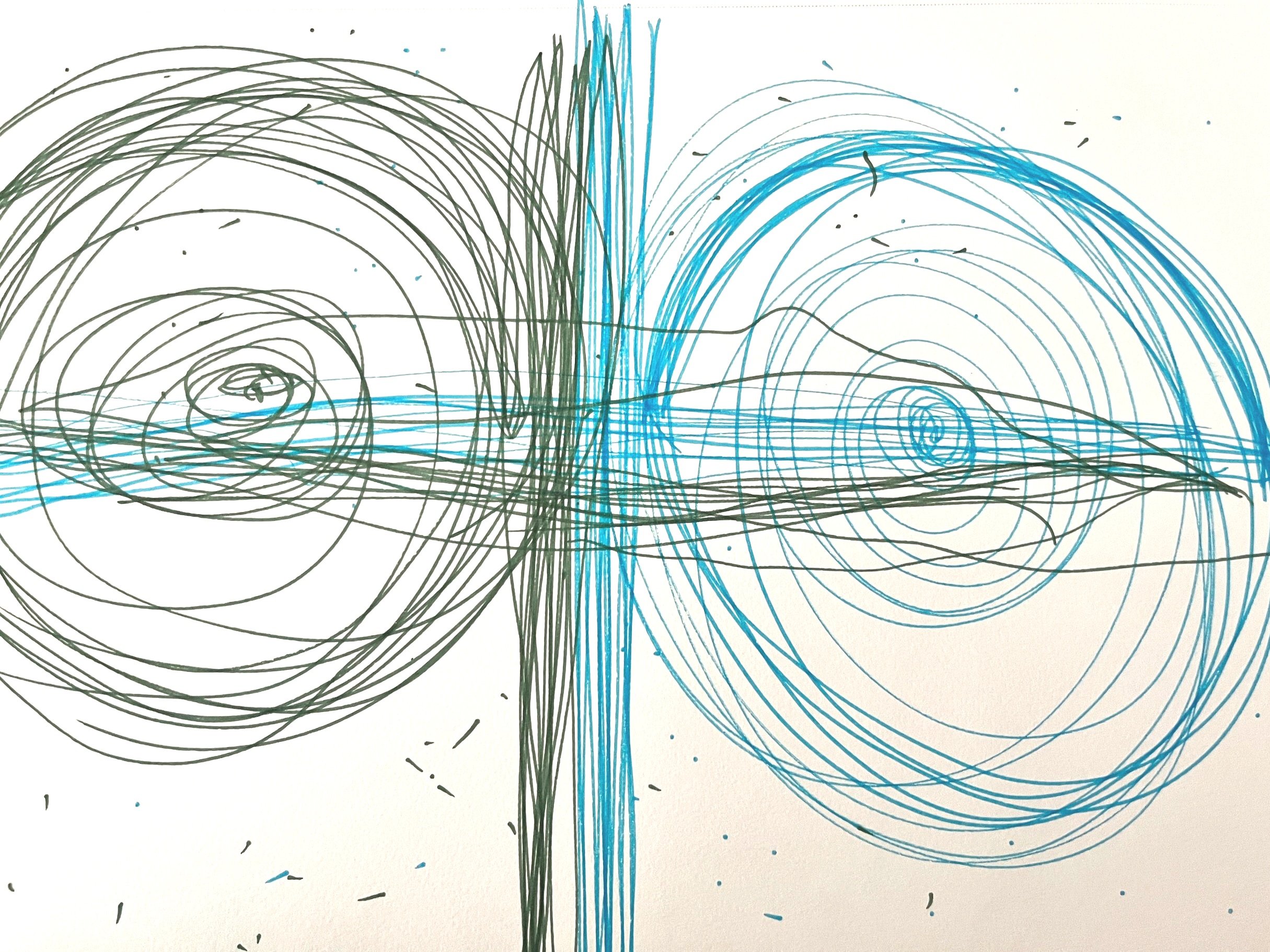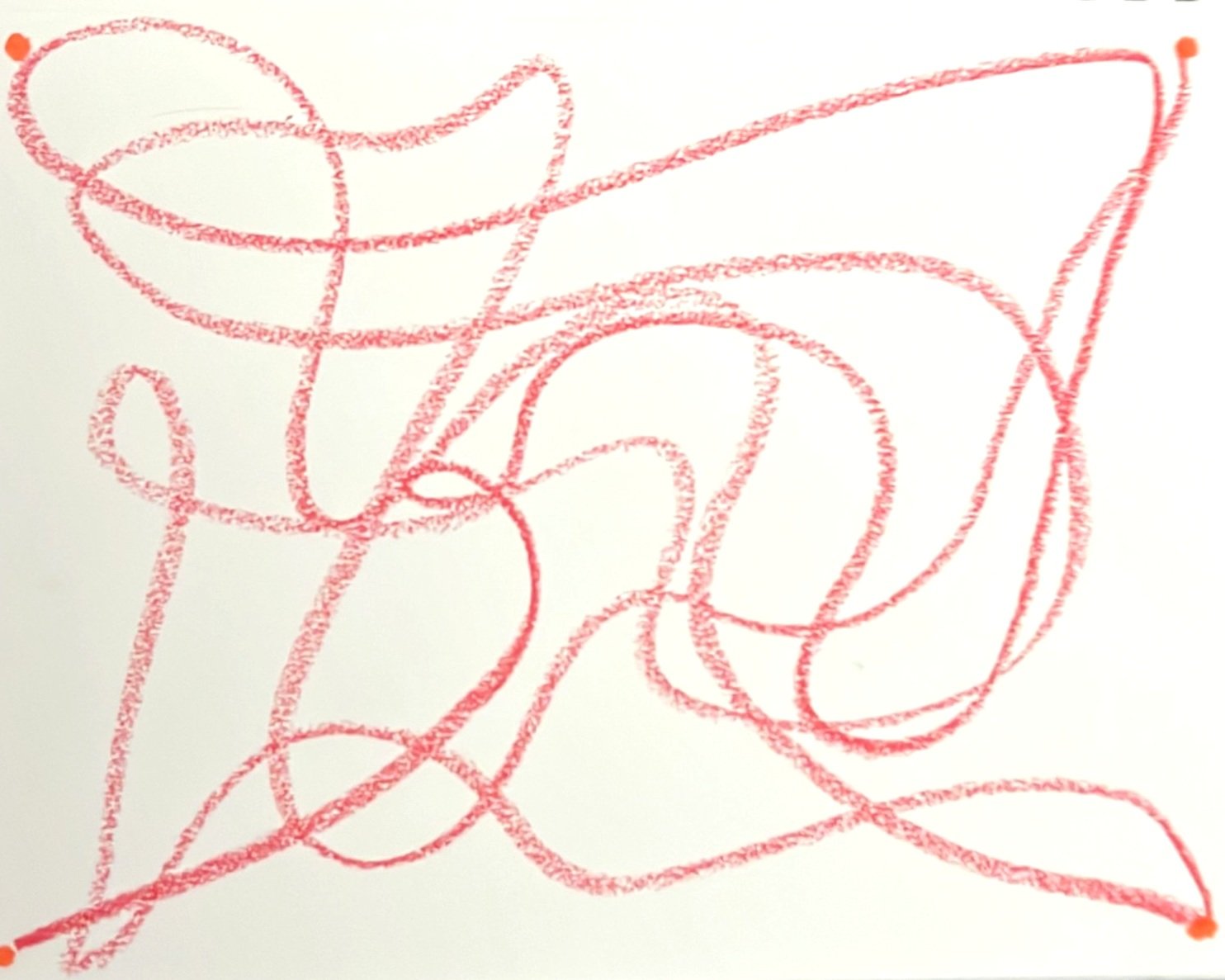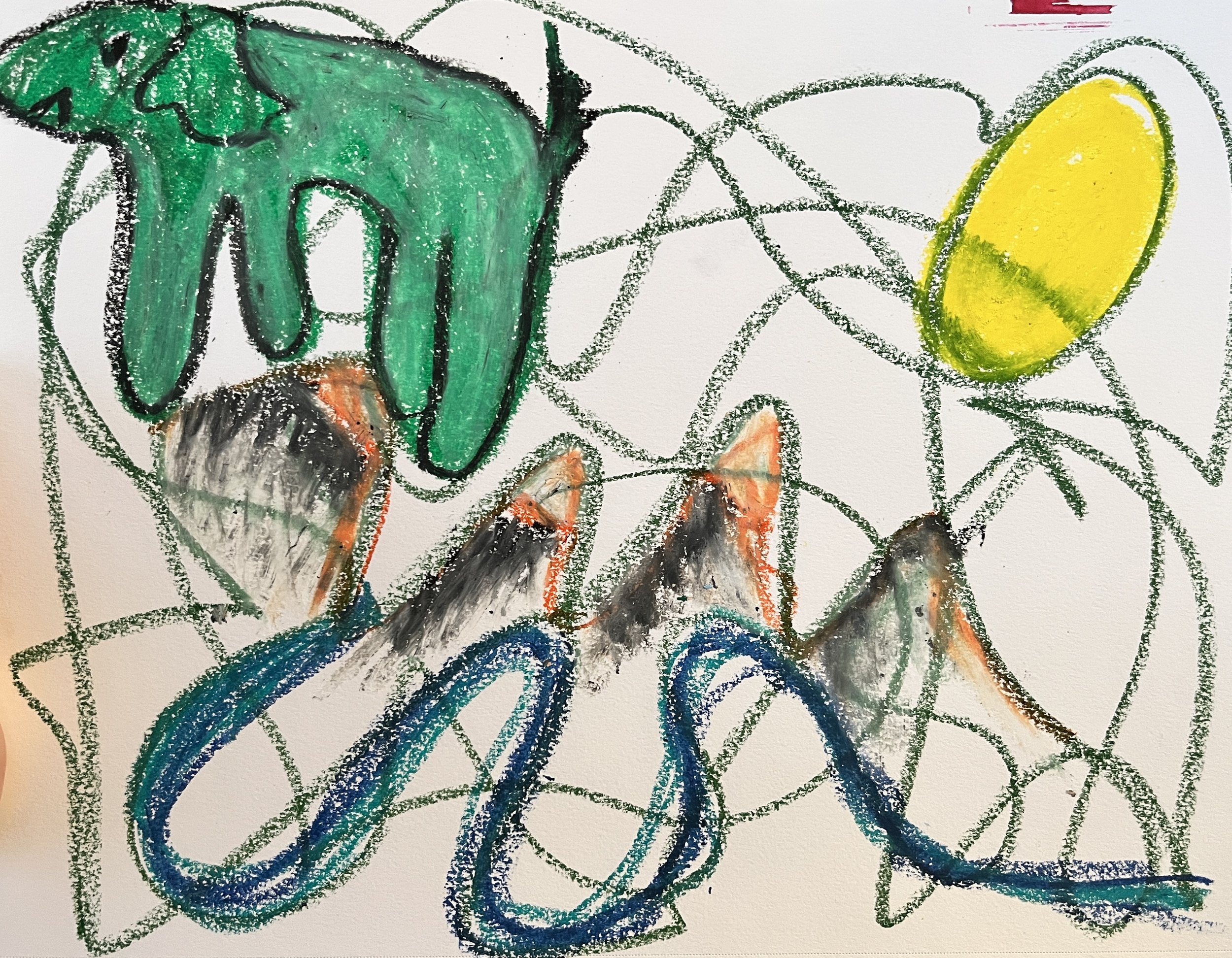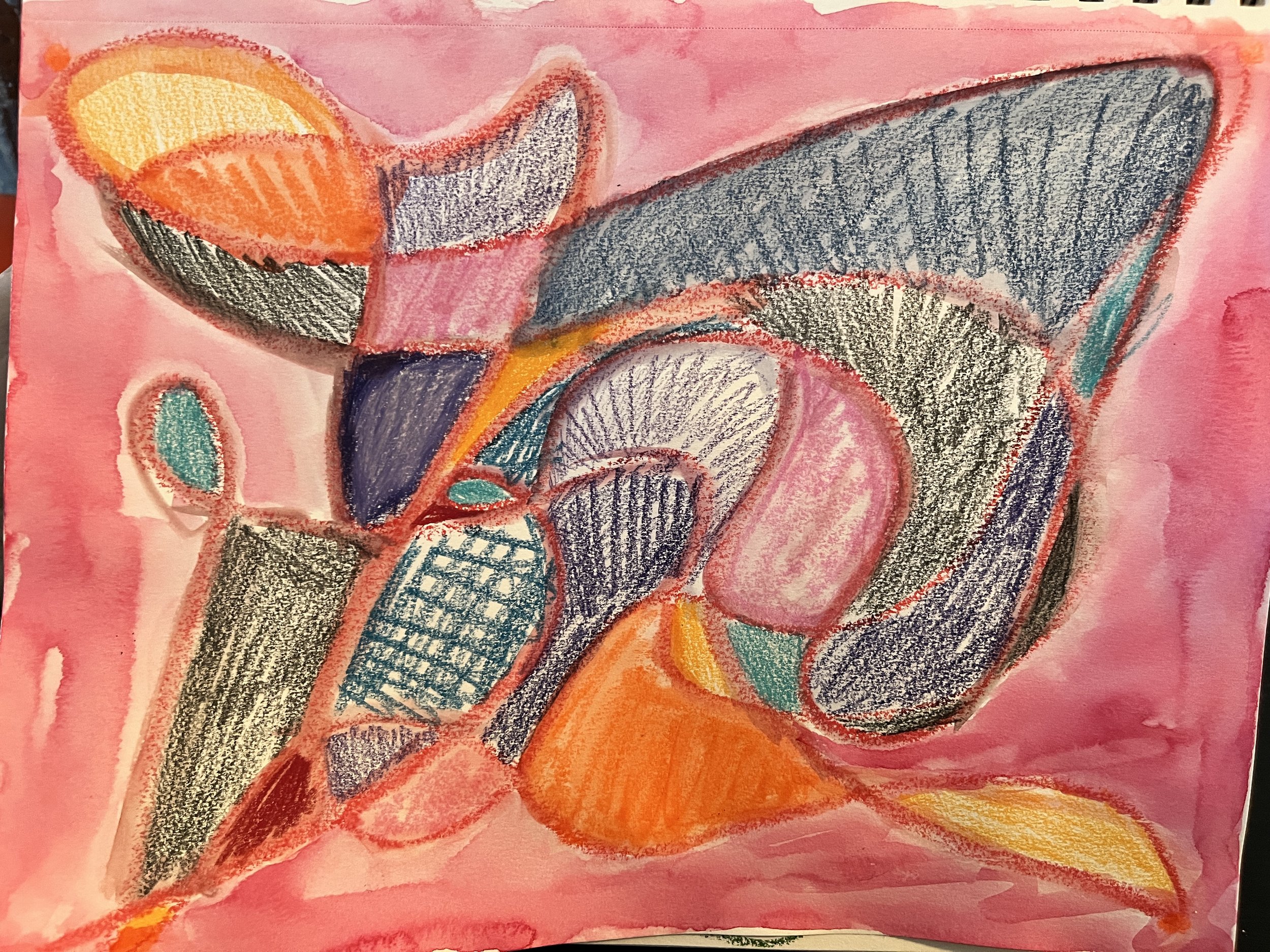Try a scribble or three…
Three easy scribble drawings for calming your mind.
Brains aren’t always the most fun places to live. Sometimes they get stuck in “danger” mode, or you may know that bad boy as Anxiety! Art therapy has long used the benefits of scribbles and mark making to help bring that danger response to a slow roll.
Here are three different kinds of scribbles you can use daily to help that brain do great things!
Take a line out for a walk
Place 1 dot in each of the four corners of your page.
Choose a colour for your line walk
Beginning in the bottom left corner, take one long line out to connect the dots in some way.
When you feel done (usually about 30 seconds) start filling in the spaces with loose colours (think scribbles!)
Imagination Scribble
Begin anywhere on your page
Continuing to cover the page with lines that are big and loopy and spikey… whatever your hands want to do. Let it go.
Step back from your page. Turn it around several times - look for items, objects, things, places or animals that might be coming out in the scribble (using your imagination)
Using other colours and lines, create the image you see in the scribble
Both Hands Scribble (AKA Bi-Lateral Scribble)
Choose two colours - one for each hand
Using both hands and colours… begin at the bottom centre of your page
Draw straight vertical lines 5 times (up and down)
Back to the centre of your page, draw straight horozontol lines 5 times (side to side) allowing your hands to cross over the centre.
Back to centre. Draw 5 semi-cricles on the top of the line 5 times.
back to Centre. Begin making small circles and let them get bigger and bigger, until you touch the edges of the page.
Back to centre. Make dots all over the page, again allowing your hands to cross over one another.
Caring, I’m trying.
I am not a business person. I am a care provider, who happens to run a business.
There is nothing comfortable about collecting money from people who are struggling just to get out of bed in the morning. It doesn’t feel good to have to chase people to make appointments or to pay their bills… but this is the world I live in.
Our governments talk a big game about making Mental Health services more accessible, and affordable. Yet, I still am required to collect and remit HST. I am not subsidized, nor can my clients claim my services under OHIP.
Yes, there are programs which will offer a time limited access to care, often CBT based and without a plan to remain connected. We know the recidivism of mental health is not addressed with CBT models, and yet that is where the funding goes. We know, we cannot help a person manage trauma, anxiety, schizophrenia, or many of the “diagnosis” in 6 sessions.
Therefore, I am running a business that attempts desperately to meet people and help them find comfort. Costs go up, and so must I charge more to keep my office open.
This is support, this is capitalism at it’s finest. Making the most vulnerable among us do more while those at the top pedantically look down, head tap them and promise to help. They won’t help, because their power relies on the backs of the lowest denominator.
I am cynical right now, I am angry and I am trying my best to do what matters most: care.
Living Out Loud
The past few years have taught me something really important: If I’m not willing to talk about the things I’m passionate about, no one else will either.
My brain struggles to even consider that I could be a voice of value to some, while also being attacked. I’ve been afraid; felt like my knowledge is not good enough – all because I recall things in snippets. I think in broad observations "I know I read a thing that one time, but maybe I got the details confused?" Anyways, I second guess myself a lot which stifles my ability to say out loud what I know to be true. I see some really cool things where people have summarized really awesome things, like they really understand them and I don’t believe I can do that.
But I can.
All this to say, I’ve started talking openly about sex, kink and BDSM, on the daily in spaces which these topics are not often expressed. When I go to kink community events I talk about Psychotherapy and art therapy. I’m actively trying to bridge these passions and so I must occupy the in between spaces where they overlap.
Why? Well, I don’t see anyone else doing it and I see the need so clearly.
So Imma ramble out loud... thanks for that skill LiveJournal.
Some thoughts on ending
What if, seeking out new love after a relationship ends wasn’t so bad?
Most will think that sex therapy is about sexual dysfunction. In a lot of ways, it absolutely is. The practice also looks at preserving relationships, managing the loss of many things – even when the relationship is good, and sometimes letting relationships down easily. Sex therapy with me is more often about intimacy than dysfunction.
I find we throw around the word intimacy without ever examining what that means. Yes, it means closeness, but what does that look like for me and my partner(s)? How do I get it or give it? More importantly, why do I want it from a partner I just ended things with?! An important part of intimacy in relationships is sex (imagine!).
Sex is more than P in V. Sex is physical closeness, emotional closeness, vulnerability, humorous and a powerful chemical soup. Sex therapy is also there to help folks learn about love, connection and touch for their own needs.
That’s a long way of saying sex is intimacy. Whoosh.
In the end of it all humans need to connect in more than one way to really find that happy chemical zing we’re all looking for. Touch and closeness are SUPER important.
The End
So you just broke up and your find yourself slogging the grief, the pain, and all you want to do is hold … anyone. But that rational part of your brain is going “woah there cowboy! You need to slow down. Don’t jump into anything wild. You need to slow down.”
We often find ourselves talking about “taking our time” and “working on me” before seeking out relationships again in an attempt not to get hurt. A social paradox exists where we desire touch connection because we’re supposed to. Sexologists have been researching and publishing on the human need for sex and intimacy for decades. The evidence is pretty clear, we need love, touch and sex. That comes with a high probability of getting hurt again and that’s why loving is one of the most vulnerable things we can do.
Without love we just wall ourselves in, we get cold and lonely – stuck. I don’t know about you but I don’t want to feel that way. It doesn’t make sense to deny yourself of the healing thing we need when we’re in distress.
Okokok
Before we go off on the “BUT HEIDI…!” My asterisk to this is – move with intention and mindfulness. Blindly leading with only emotion often does not take us to the places we want to be, and we cannot discount the wisdom of those emotions. We need both ration and emotion (Hi, DBT!) to fuel us towards a sense of wellbeing.
TL;dr: Loving after love is healthy and a way of healing. If it feels good for you go play, hug, kiss, fuck.
Sexual Education Resources
It all begins with an idea.
A very short and incomplete list of sexual education, sexual safety and medical clinic links for your everyday needs!
General Sexual Health
Hassle Free Clinic, Toronto
SHORE Centre, Waterloo (sexual health, options, resources and education)
The Society of Obstetricians and Gynecologists of Canada
Doin’ It, Waterloo
Gender Affirming Care
Transgender Youth Clinic, SickKids
Teen Clinic, St. Michael’s Hospital
Open Arms OB/GYN, Toronto
Dr. Dustin Costescu, Hamilton
Central Toronto Youth Services, Toronto
Trans Primary Care, Info for care providers and clients
Rainbow Health Ontario Trans FAQ, Database
Abortion Information and Resources
Shout Your Abortion - Resources, information and access (U.S)
SHORE Centre, Waterloo (sexual health, options, resources and education)
Other General Resources



